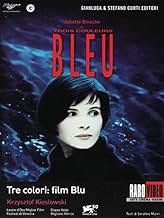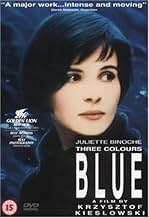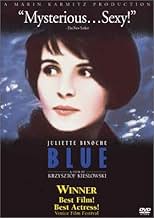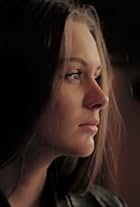A woman struggles to find a way to live her life after the death of her husband and child.A woman struggles to find a way to live her life after the death of her husband and child.A woman struggles to find a way to live her life after the death of her husband and child.
- Awards
- 22 wins & 19 nominations total
Benoît Régent
- Olivier
- (as Benoit Regent)
Charlotte Véry
- Lucille
- (as Charlotte Very)
Hélène Vincent
- La journaliste
- (as Helene Vincent)
Yann Trégouët
- Antoine
- (as Yann Tregouet)
Featured reviews
How do we know what it is, essentially, that we liked about a movie? Which is to say, what do we come to know about this viewer who was affected? And what do we say of that experience, do we ascribe it outside of us? No, that's just a bunch of words.
This is what we have here, questions of memory and meaning. A woman as viewer of a movie taking spontaneous shape around her (played by Binoche as placid observer), that pokes holes in herself and provokes questions; finally overcoming it by being pulled forward by what was left incomplete in it.
A woman who has lost everything as the film begins, every anchor in her life violently removed in one swoop and she's now cast adrift. We have the whole film as her own inner drift through an interminable flow. Kieslowski evokes this with lush dissonance between visual segments, cuts and fades that leave life in suspense. There is scant story, all about living with these fragments. Music erupts around her in sudden intervals; but music that's coming from inside of her and being hallucinated.
It's the world of memory and inner life. Tarkovsky enters this with long, mystifying sweeps of the camera that lift bearings and slip into dreams and ruminations. Kieslowski by contrast caresses their outline, the surface of emotions as they glide over the eyes. It's not difficult like Tarkovsky or Ruiz can be, but pleasant in the way of Kar Wai. It goes down rather easy, you can see it for just the surface shift.
Kieslowski had spent the whole 10 hours of the Dekalog training this ability to dream in advance. It pays off here. Each of the 10 Dekalogs was about a narrative that an earth-shattering revelation comes along and creates a change in viewing. You will see this here obviously. But Dekalog had a contrast; some of it was Kieslowski opening corridors in the imagining with his camera, most was characters stumbling into revelations and articulating feelings. Here I'm happy to note this tension is resolved in favor of the eye; the whole is about visual slippage through cracks in story.
He lets blue lights shine on screen as music soars in crescendos, he gives us closeup shots of eyes; the eye that colors. At other points he introduces memory as images before a viewer: the funeral playing on a screen, images of her husband on TV that when shuffled through reveal a mistress. Most eloquently, images on TV of someone being cast over a void with a bungee chord as her anxiously precarious drift with nowhere to hold. She's fading from even the mind of her mother.
For the end he reserves a tableaux of joined moments from lives as they are suspended briefly in mind. It's all being endlessly relived and combined like the music she works to complete with her composer friend. The music is central here.
Not just as the memory of what was collaboratively lived with her composer husband, the emotion that was absorbed and now erupts again, but also as the sheet where an incomplete piece beckons for the work of continued imagination. The shot of this sheet as scribbled notes end and lines stretch interminably is the abstract heart at the bottom of it.
Had another woman not made a copy of the score, it would have disappeared when she burnt it. Had she come by to pick up the photos of her husband, she might have burnt them with everything else and never found out about the mistress. But it's all this what eventually pulls her out of herself.
This is what we have here, questions of memory and meaning. A woman as viewer of a movie taking spontaneous shape around her (played by Binoche as placid observer), that pokes holes in herself and provokes questions; finally overcoming it by being pulled forward by what was left incomplete in it.
A woman who has lost everything as the film begins, every anchor in her life violently removed in one swoop and she's now cast adrift. We have the whole film as her own inner drift through an interminable flow. Kieslowski evokes this with lush dissonance between visual segments, cuts and fades that leave life in suspense. There is scant story, all about living with these fragments. Music erupts around her in sudden intervals; but music that's coming from inside of her and being hallucinated.
It's the world of memory and inner life. Tarkovsky enters this with long, mystifying sweeps of the camera that lift bearings and slip into dreams and ruminations. Kieslowski by contrast caresses their outline, the surface of emotions as they glide over the eyes. It's not difficult like Tarkovsky or Ruiz can be, but pleasant in the way of Kar Wai. It goes down rather easy, you can see it for just the surface shift.
Kieslowski had spent the whole 10 hours of the Dekalog training this ability to dream in advance. It pays off here. Each of the 10 Dekalogs was about a narrative that an earth-shattering revelation comes along and creates a change in viewing. You will see this here obviously. But Dekalog had a contrast; some of it was Kieslowski opening corridors in the imagining with his camera, most was characters stumbling into revelations and articulating feelings. Here I'm happy to note this tension is resolved in favor of the eye; the whole is about visual slippage through cracks in story.
He lets blue lights shine on screen as music soars in crescendos, he gives us closeup shots of eyes; the eye that colors. At other points he introduces memory as images before a viewer: the funeral playing on a screen, images of her husband on TV that when shuffled through reveal a mistress. Most eloquently, images on TV of someone being cast over a void with a bungee chord as her anxiously precarious drift with nowhere to hold. She's fading from even the mind of her mother.
For the end he reserves a tableaux of joined moments from lives as they are suspended briefly in mind. It's all being endlessly relived and combined like the music she works to complete with her composer friend. The music is central here.
Not just as the memory of what was collaboratively lived with her composer husband, the emotion that was absorbed and now erupts again, but also as the sheet where an incomplete piece beckons for the work of continued imagination. The shot of this sheet as scribbled notes end and lines stretch interminably is the abstract heart at the bottom of it.
Had another woman not made a copy of the score, it would have disappeared when she burnt it. Had she come by to pick up the photos of her husband, she might have burnt them with everything else and never found out about the mistress. But it's all this what eventually pulls her out of herself.
Blue is one of those little movies that grows on you. The more you think about it the more you like it. That's not to say that it's not enjoyable to view; the cinematography and music are marvelous. But this is Juliette Binoche's movie. Everything revolves around her character, Julie, who, in the first scene, survives an automobile accident that claims the lives of her famous composer husband and her five-year-old daughter. Now alone the remainder of the movie delves into Julie's long emotional recovery. Not traumatic, or depressing as the subject matter may imply it is instead subtle, graceful, and beautiful.
10patita-1
The subject(mourn,lost)is so interesting and profound that this film is a real treasure. It is very difficult to write about 'Bleu' because this film has so many intense scenes,with many details.Juliette Binoche's vulnerability is in every scene, every gesture, every moment. She plays an enigmatic woman,'Julie,' we're witness to her terrible loss(her husband who was a famous composer and her daughter died in a car crash)She is the survivor,not only of the accident,but of herself too.The film doesn't show us how her life was before the tragedy,but' Bleu' focuses on her personal journey to healing.
Julie seems stoic,she did not criy hysterically or stay in bed totally depressed,her grief is intimate and touching.In one scene when Julie is near the blue crystal mobile(which belonged to her daughter) just notice her reaction.Another poignant scene is when Julie is in that swimming pool,suddenly,she stops and she can hear her husband's symphony(all in her head).
Bleu also approaches a philosophical question-when you lose everything can you start all over again?,life is a series of events and choices,Julie moves to another place from the country to a city.She did not want to see her friends,she wants to be alone but is this possible?,her past will haunt her.
Another interesting aspect of this film is the use of music instead of dialogue,her silence is a reference of her terrible loss and pain,she is not depressed but sad. Also the meaning of the unfinished symphony of her husband is very profound (is connected with her grief and healing)
The photography of the film and the beautiful and delicate face of Binoche contribute to the impact of BLEU.
Kieslowski was one of the most talented directors, I really admired his 'Trois couleurs' trilogy but I think,'Bleu' was his most powerful film.
10/10
Julie seems stoic,she did not criy hysterically or stay in bed totally depressed,her grief is intimate and touching.In one scene when Julie is near the blue crystal mobile(which belonged to her daughter) just notice her reaction.Another poignant scene is when Julie is in that swimming pool,suddenly,she stops and she can hear her husband's symphony(all in her head).
Bleu also approaches a philosophical question-when you lose everything can you start all over again?,life is a series of events and choices,Julie moves to another place from the country to a city.She did not want to see her friends,she wants to be alone but is this possible?,her past will haunt her.
Another interesting aspect of this film is the use of music instead of dialogue,her silence is a reference of her terrible loss and pain,she is not depressed but sad. Also the meaning of the unfinished symphony of her husband is very profound (is connected with her grief and healing)
The photography of the film and the beautiful and delicate face of Binoche contribute to the impact of BLEU.
Kieslowski was one of the most talented directors, I really admired his 'Trois couleurs' trilogy but I think,'Bleu' was his most powerful film.
10/10
An accident results in loss and pain, the rejection of a world that you refrain, you seek withdrawal, isolation, segregation, separation, and transition to a life, where you abstain. But seclusion still has links and ties and cords, that retract and pull and cannot be ignored, reconnection through a box, reveals a secret that's unlocked, that begins to reconnect, and to restore.
It's a wonderful performance from Juliette Binoche as she elegantly weaves Kieslowski's tale of freedom into a contemporary setting. Packed full of symbolism that requires numerous visits to absorb, you may find a myriad of interpretations of your own too.
It's a wonderful performance from Juliette Binoche as she elegantly weaves Kieslowski's tale of freedom into a contemporary setting. Packed full of symbolism that requires numerous visits to absorb, you may find a myriad of interpretations of your own too.
This movie is one of my favorites.
The disturbing topic of a woman who can't deal with the loss of her husband and child transforms into an essay on the impossibility of isolation. It is a quiet, personal movie that spends most of it's time with the main character played excellently by Juliette Binoche.
The color blue is very evident in the film,and a fade to a simple blue screen is used to show times of deep emotion. Although the characters are set in a specific time and place ( France just before the formation of the EU ) the focus on the personal journey of grief transcends the setting.
I like the way this film changes from a story about a death to an affirmation to life. I like the way that little things like mice in the apartment loom large in the thought of our main character, where as what others consider important such as finishing her husband's symphony seem very minor .
It feels like diving deep through cold dark water to finally swim toward the light. One passes through emotional turmoil to come out the other side. I found it a very satisfying.
The disturbing topic of a woman who can't deal with the loss of her husband and child transforms into an essay on the impossibility of isolation. It is a quiet, personal movie that spends most of it's time with the main character played excellently by Juliette Binoche.
The color blue is very evident in the film,and a fade to a simple blue screen is used to show times of deep emotion. Although the characters are set in a specific time and place ( France just before the formation of the EU ) the focus on the personal journey of grief transcends the setting.
I like the way this film changes from a story about a death to an affirmation to life. I like the way that little things like mice in the apartment loom large in the thought of our main character, where as what others consider important such as finishing her husband's symphony seem very minor .
It feels like diving deep through cold dark water to finally swim toward the light. One passes through emotional turmoil to come out the other side. I found it a very satisfying.
Storyline
Did you know
- TriviaAt the 2018 Visegrad Film Forum, cinematographer Slawomir Idziak claimed that the script and initial cut of this film focused on the journalist character (played by Hélène Vincent) and her efforts to investigate the authorship of the unfinished musical composition that drives the plot. It was only during the editing process that director Krzysztof Kieslowski re-structured the film to focus on Julie (played by Juliette Binoche).
- GoofsWhen Oliver tells Julie he will not incorporate her changes into the musical score, a boom mic is visible briefly as Julie puts down the phone.
- Quotes
Julie Vignon: Now I have just one thing left to do: nothing. I want no possessions, no memories, no friends, no lovers -- they're all traps.
- Crazy creditsThe final credit says in French, "We thank Alfa Romeo who allowed the scene of the accident to the Alfa 164 whose dynamics are of course purely imaginary."
- ConnectionsFeatured in The 51st Annual Golden Globe Awards (1994)
- How long is Three Colors: Blue?Powered by Alexa
Details
- Release date
- Countries of origin
- Official site
- Languages
- Also known as
- Ba Sắc Màu: Xanh
- Filming locations
- Palais de Justice, Paris 1, Paris, France(hall of justice)
- Production companies
- See more company credits at IMDbPro
Box office
- Gross US & Canada
- $1,324,974
- Opening weekend US & Canada
- $6,413
- Dec 5, 1993
- Gross worldwide
- $1,552,478
- Runtime1 hour 38 minutes
- Color
- Sound mix
- Aspect ratio
- 1.85 : 1
Contribute to this page
Suggest an edit or add missing content

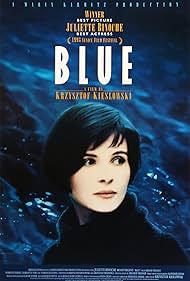
![Watch Bande-annonce [OV]](https://m.media-amazon.com/images/M/MV5BZGFhMTA5ODQtM2Q4OC00NTI0LTkyYjgtMGViODA0YWZjZmI3XkEyXkFqcGdeQXRyYW5zY29kZS13b3JrZmxvdw@@._V1_QL75_UX500_CR0,47,500,281_.jpg)
![Three Colors: Blue: The Criterion Collection [Blu-ray]](https://m.media-amazon.com/images/M/MV5BZThmZGMzY2EtZTdiNy00NjMwLTk1YTQtOTVlNGIxYjRhZGYzXkEyXkFqcGdeQXVyNzU1NzE3NTg@._V1_QL75_UX500_CR0,47,500,281_.jpg)

